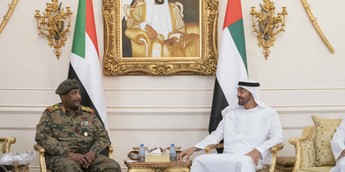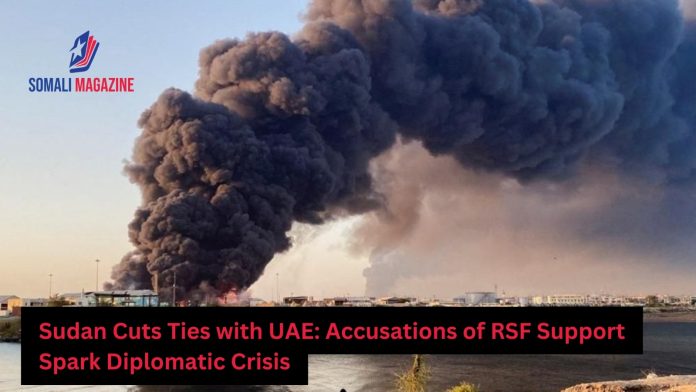Facebook Twitter (X) Instagram Somali Magazine - People's Magazine
Sudan has officially severed diplomatic relations with the United Arab Emirates (UAE), escalating tensions between the two nations amid accusations that Abu Dhabi has been backing the paramilitary Rapid Support Forces (RSF). The decision, announced by Sudan’s Defense Minister Yassin Ibrahim on May 6, 2025, follows a series of drone strikes on Port Sudan, which the Sudanese government has blamed on RSF fighters allegedly armed by the UAE.
The Sudanese government declared the UAE an “aggressor state,” accusing it of violating Sudan’s sovereignty through its alleged support for RSF, a paramilitary group that has been engaged in a brutal conflict with the Sudanese army since April 2023. The severance of ties means Sudan will withdraw its ambassador from Abu Dhabi and shut down its diplomatic missions in the Gulf nation.
The move comes after the International Court of Justice (ICJ) dismissed Sudan’s lawsuit accusing the UAE of complicity in genocide in Darfur. The court ruled that the case could not proceed because the UAE had opted out of Article 9 of the Genocide Convention, which prevents states from suing each other over genocide allegations.
The conflict between Sudan’s army and RSF has devastated the country, killing thousands and displacing over 13 million people. The war has effectively split Sudan into two factions, with the army controlling the north, east, and center, while RSF dominates much of the western Darfur region and parts of the south.
The latest escalation follows three consecutive days of aerial attacks on Port Sudan, a city previously regarded as one of the safest places in the war-ravaged nation. Drone strikes have hit key infrastructure, including an international airport, a major power station, and a hotel, further destabilizing the region.

Sudan’s government has consistently accused the UAE of supplying RSF with advanced weaponry, a claim Abu Dhabi has repeatedly denied. Despite these denials, Sudanese officials insist that the UAE has played a direct role in fueling the conflict. “The entire world has witnessed, for more than two years, the crime of aggression against Sudan’s sovereignty, territorial integrity, and the safety of its citizens by the UAE, acting through its local proxy, the terrorist RSF militia,” Defense Minister Ibrahim stated.
The diplomatic fallout has drawn international attention, with both the UK and the US previously urging external actors to cease backing Sudan’s warring factions. The UAE, however, has maintained that it is committed to peace and humanitarian aid in Sudan. Reem Ketait, the UAE’s deputy assistant minister for political affairs, responded to Sudan’s accusations by calling for urgent international action to end the war and ensure humanitarian assistance reaches those in need.
As Sudan navigates this diplomatic crisis, the severance of ties with the UAE marks a significant shift in regional alliances. The Sudanese government has vowed to respond to what it calls “UAE aggression” by all means necessary to preserve its sovereignty. The coming weeks will be crucial in determining whether Sudan’s decision will lead to further escalation or open the door for renewed diplomatic negotiations.

